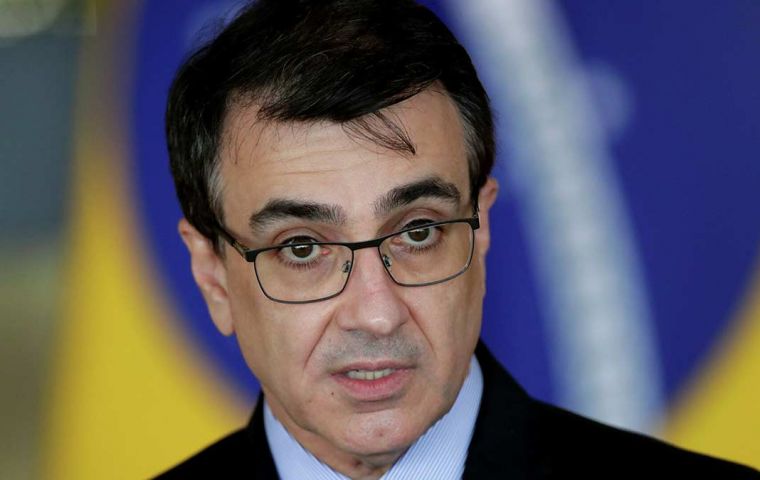MercoPress. South Atlantic News Agency
Brazil confident of its OECD access roadmap, which should make EU/Mercosur deal more expeditious
 Minister Franca said Brazil’s “access roadmap” to OECD should take two/three years to complete but Brasilia is working to accelerate the process”
Minister Franca said Brazil’s “access roadmap” to OECD should take two/three years to complete but Brasilia is working to accelerate the process” Once Brazil has been admitted to the Organization for Economic Cooperation and Development, OECD, the ratification process for the Mercosur/European Union trade agreement, will become more viable, according to Brazilian foreign minister Carlos Franca.
The minister said that Brazil’s “access roadmap” to the OECD should take two or three years to complete but assured that the Brazilian government is working to accelerate the process and bring that deadline forward.
“Without a doubt, with Brazil member of OECD, which brings together ambassadors from most European Union countries, we will be in a privileged position to dialogue with these countries. By joining the organization, we will have a better channel to transmit the Brazilian vision on all the issues that we have to address, environment, productivity, social inclusion, and public and private governance,” added Franca.
The Mercosur/EU trade deal was approved in 2019 after 20 years of negotiations, but still needs the ratification by the parliaments of all countries in the two blocs before going into force. However, several European countries (France, Ireland, Poland, Belgium) have withdrawn their approval for the agreement, which will require additional negotiations.
The Minister explained that the OECD “accession roadmap” received by Brazil earlier this month provides guidelines and breaks down the policies required for a country to join the group. By the end of the year, França estimates, Brazil will submit an initial memorandum to finalize the membership application.
According to the minister, Brazil has the advantage of having already adopted 112 of the 257 normative instruments of the OECD. To join the group, which brings together the most industrialized economies on the planet, OECD demands at least 229 legal instruments. “Brazil is the country that historically adhered to the largest number of instruments even before the accession process started,” he pointed out.
The Minister stated that one indication that the OECD will be willing to expedite the accession process is that the theme committees that will assess the Brazilian plan will operate in tandem, eliminating the need to wait for one committee to complete its work before opening another. At least four theme committees are planned: taxation, environment, human rights, governance (public and private), and productivity.
According to Carlos França, the Brazilian government is committed to the basic guidelines of the OECD, and enumerated some of the issues, best public governance practices, greater transparency, the fight against corruption, and the creation of a better business environment (customs facilitation and reduction of bureaucracy in foreign trade, tax collection, opening of businesses, and internal organization of companies).
“The path to modernity, to bring more investment to Brazil, demands a commitment to these principles. These are principles that Brazilian society desires. We think that this is a State policy,” commented Carlos França. He recalled that, since 2015, Brazil has been a key partner of the OECD and is a close follower of international organization guidelines.
In the coming months, explained França, the government intends to discuss adherence to the legal instruments still lacking with the National Congress, business institutions, such as the National Confederation of Industry (CNI), and society. The Minister claims to have met with deputies and senators and indicated that Congress is willing to speed up the necessary discussion and votes.




Top Comments
Disclaimer & comment rulesCommenting for this story is now closed.
If you have a Facebook account, become a fan and comment on our Facebook Page!